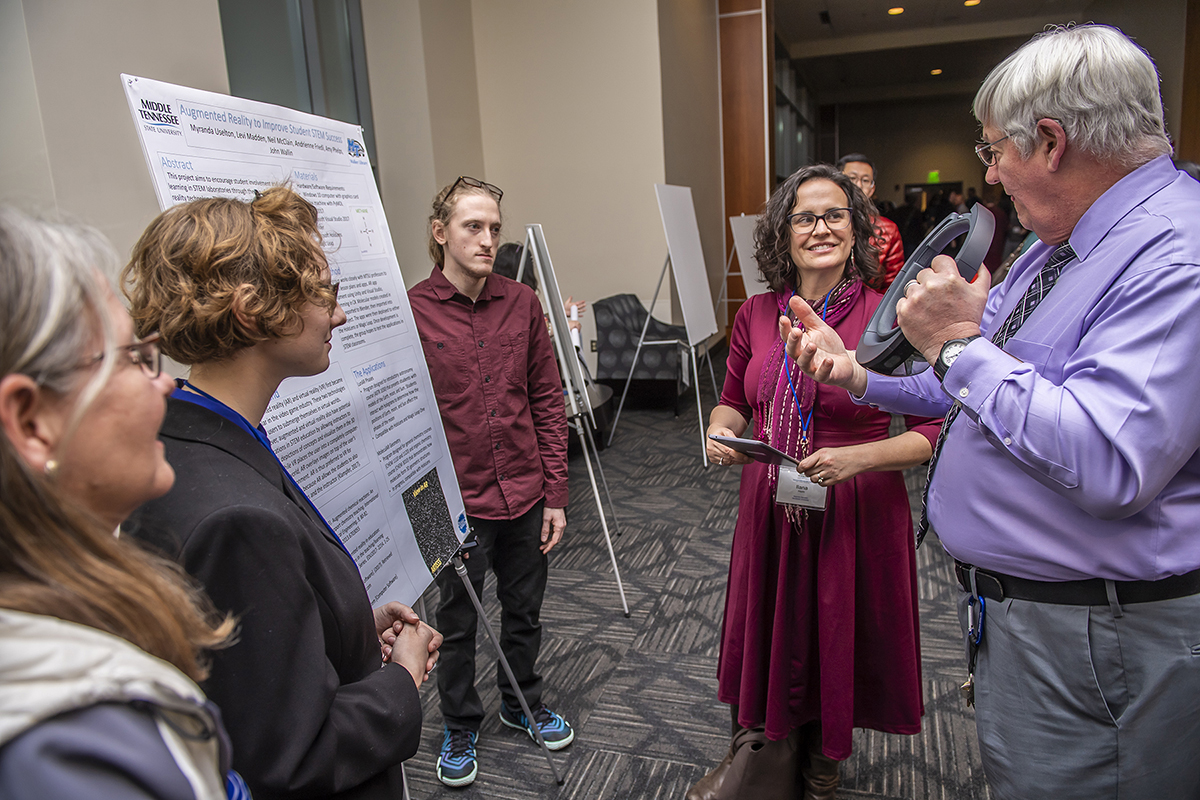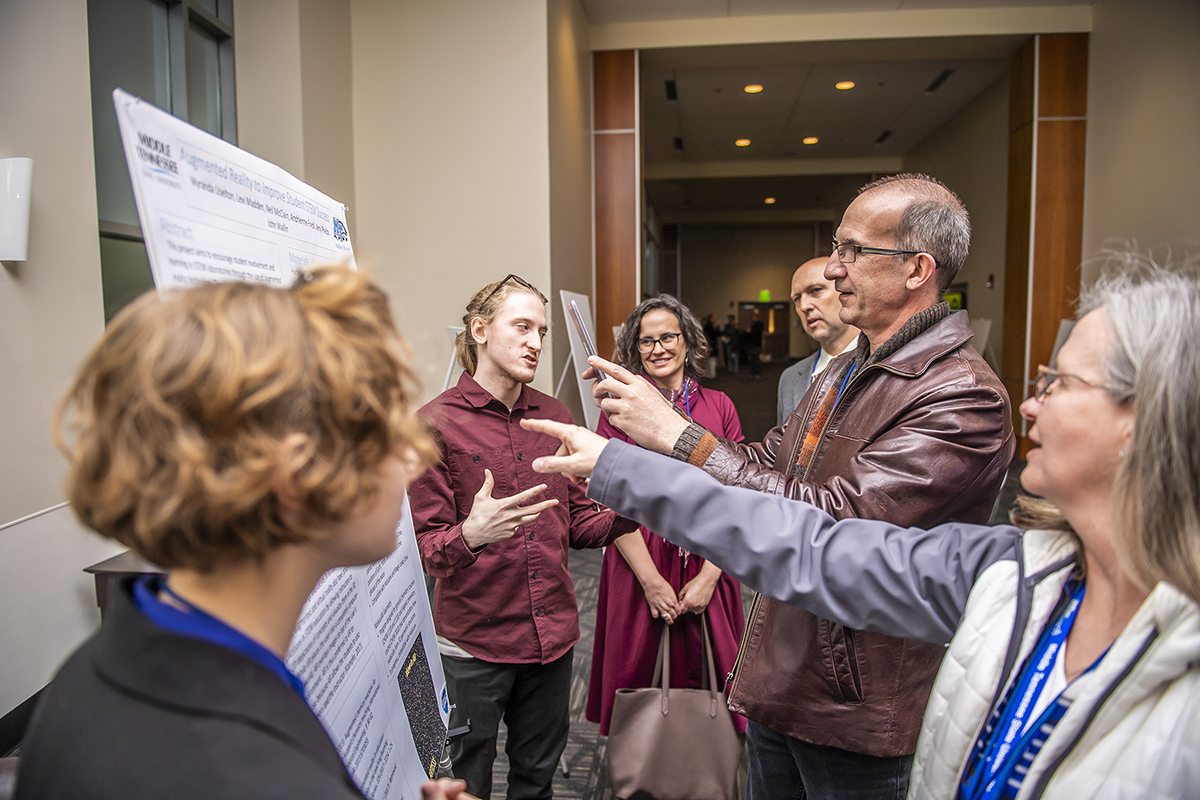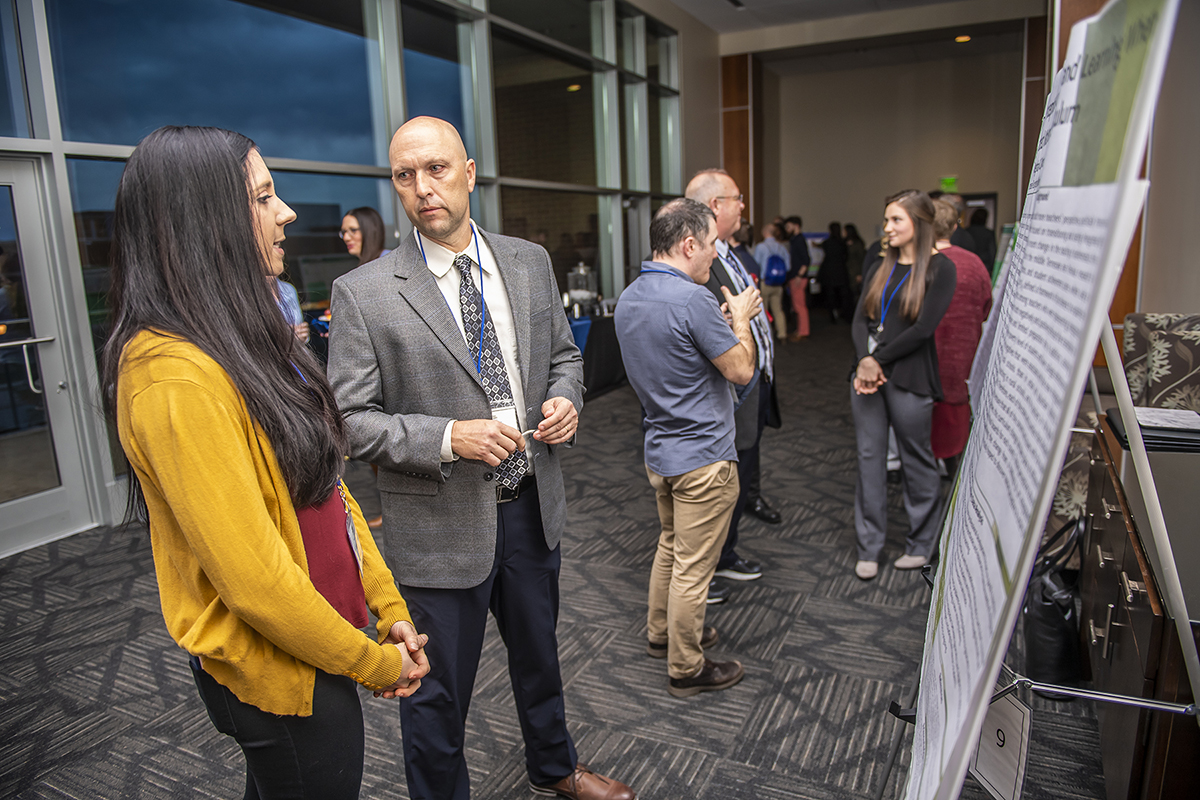Tennessee STEM Education Center conference first-day keynote speaker Ilana Horn viewed a newspaper report on the state’s high school students being unprepared for college in math — her specialty — or reading that included multiple reasons for the apparent problems.
Horn is a professor of mathematics education at Vanderbilt University’s Peabody College in Nashville, Tennessee. Her research and teaching focus on making high-quality math accessible to more students, especially those historically underserved or marginalized by the state and U.S. educational system.

MTSU’s Neal McClain, right, director of the computer science lab in the James E. Walker Library, helps explain the “Augmented Reality to Improve Student STEM Success” research project to Ilana Horn, center right, professor of mathematics education at Vanderbilt University’s Peabody College, Feb. 14 on the first day of the Tennessee STEM Education Center’s 13th annual conference in the Student Union Building. Listening are McClain’s faculty and student partners in the project: professor Amy Phelps, left, Myranda Uselton and Levi Madden. (MTSU photo by Eric Sutton)
The data, released Feb. 13 by the state Senate Education Committee, confirms that many systems struggle to prepare students for community college and universities in math and reading, while others are more successful.
Horn was part of a two-day conference in the Student Union that brought educators from across the state and region to MTSU to discuss STEM education and applying it in kindergarten through graduate degrees.
More than 140 people attended the 13th annual conference — the first for new Tennessee STEM Education Center director Greg Rushton.
The state’s information reveals 46 percent of about 33,000 high school graduates at the state’s public colleges in 2016-17 needed remedial efforts in math and 33 percent needed remedial efforts in reading. The students graduated from high school in May 2016 and entered college that fall. There’s no data for students who went to private colleges.
 “This is not a new story. This is a very old story, and there’s a lot of different ways to look at this story,” Horn said Feb. 14 of the latest math/reading numbers supplied by the state.
“This is not a new story. This is a very old story, and there’s a lot of different ways to look at this story,” Horn said Feb. 14 of the latest math/reading numbers supplied by the state.
“This is about teacher preparation, about work conditions, about math teacher shortage and about the different pressures that kids are experiencing and the lack of support for helping them gain skills they need to grow to be successful students.”
“I’ve seen a lot of teachers feel very frustrated in the last 10 to 15 years over the pressures around test scores because they feel like the pressure to keep up with the pace of the curriculum, which is very packed and very full, pushes them against that idea of helping kids come along and really develop that understanding,” Horn added.
Horn said there is a correlation in the math and reading scores: that “stronger readers would out-perform the weaker readers” in math.
The math expert said four decades of research is available in math and science education, but there’s a “gap between what we know good teaching is like and what often happens in schools. A lot of times it’s not a teacher-blaming situation. It’s about resources and supports and conditions.”

Vicente Talanquer, second from right, University of Arizona Department of Chemistry and Biochemistry Distinguished Professor and a conference keynote speaker, takes a cell phone photo of an MTSU student-faculty research project, “Augmented Reality to Improve Student STEM Success,” Feb. 14 on the first day of the Tennessee STEM Education Center’s annual conference in the Student Union Ballroom. Chemistry professor Amy Phelps, right, points out specific details. Also shown are Myranda Uselton, left; Levi Madden, who is explaining the project, center left; math professor Ilana Horn of Vanderbilt University’s Peabody College; and Greg Rushton, first-year director of the Tennessee STEM Education Center. (MTSU photo by Eric Sutton)
Brett Wainz, who teaches seventh-grade science at Siegel Middle School, said Horn’s references to “research for improving math instruction for students” is useful.
“The more we can research, the better off for students in the future,” he added.
The Feb. 15 luncheon keynote speaker, Vicente Talanquer from the University of Arizona, discussed “Reinventing the Foundations” of chemistry. He is the first university distinguished professor in the Department of Chemistry and Biochemistry at Arizona.
Educators came from colleges in Tennessee, Alabama and Kentucky. Participating school systems included Metro Nashville, Murfreesboro City and Rutherford, Wilson, DeKalb, Clarksville/Montgomery, Franklin, Sumner and Williamson county schools.
Rushton said the 14th conference will shift from MTSU, where it has been held for 13 years, to Tennessee Tech’s campus in Cookeville, Tennessee, for the Feb. 13-14, 2020, event.
The conference was hosted by the Tennessee STEM Education Center, Tennessee Tech, the MTSU Mathematics and Science Education Ph.D. program, the Tennessee STEM Innovation Network, the College of Basic and Applied Sciences and the Office of Research Services.

Tennessee STEM Education Center Director Greg Rushton, right, listens to Meghan Clemons of Tennessee Tech, left, discuss the research project she conducted and presented Feb. 14 during the MTSU center’s 13th annual STEM conference in the Student Union Building. (MTSU photo by Eric Sutton)

COMMENTS ARE OFF THIS POST